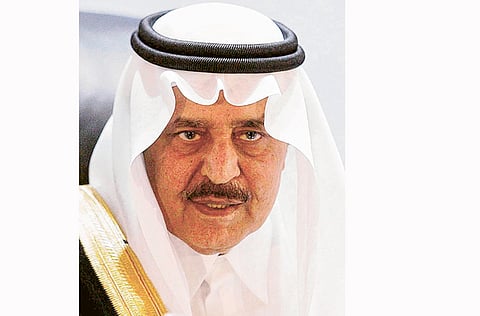Nayef could get leadership role
Fight against Al Qaida elevated Nayef's stature in Saudi Arabia

Riyadh: Interior Minister Prince Nayef Bin Abdul Aziz is one of the most powerful players in Saudi Arabia.
As interior minister and second deputy prime minister, Nayef is considered to be in a strong position to assume leadership of the country in the event of serious health problems afflicting the king and crown prince.
Nayef was born in the city of Taif around 1934 and is the half-brother of King Abdullah and son of state founder Abdul Aziz Bin Saud. He became Riyadh governor at the age of 20.
He has been interior minister since 1975 and got promoted as second deputy prime minister in 2009 when Crown Prince Sultan was out of the country to convalesce after medical treatment. Nayef played a crucial role in dealing with a series of Al Qaida attacks on expatriate housing compounds, oil and industrial facilities inside the kingdom from 2003 to 2006.
The confrontation helped him extend his authority into foreign policy, religious affairs and the media. Since his promotion he has taken on additional duties by chairing cabinet meetings while Abdullah and Sultan were away.
Conservative force
His son, Mohammad Bin Nayef, is the Saudi counter-terrorism chief.
Prince Nayef is one of the most conservative forces in the ruling family and is feared by liberals and reformers. Shortly before his promotion last year, Nayef said he saw no need for female lawmakers or to hold elections at all. He has repeatedly backed the religious police apparatus who roam streets to make sure that shops and restaurants close for prayers and unrelated men and women do not mix. Diplomats say Nayef is unlikely to pursue many social or political reforms if he were to become king one day. They say his ministry was behind the banning of the country's only film festival in summer 2009, a move that shocked liberals.
While Nayef is not expected to reverse much-needed economic reforms to create jobs, he may slow plans to overhaul the judiciary because it would mean curbing the influence of clerics who command wide powers as judges, diplomats say.
In June he admonished the religious police to treat people with respect, a move described by an official at the interior ministry as showing that Nayef can be flexible. "He had gained their confidence by praising them much first, and then asked for change. If he criticised the religious police from the start they would not listen to him," the official said.


